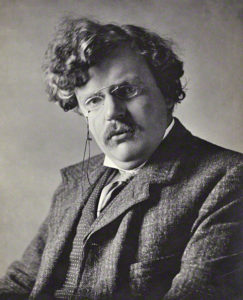G.K. Chesterton, Collected Works, Volume XXX

G.K. Chesterton wrote a weekly column for The Illustrated London News from the mid-1900s to the mid-1930s. Ignatius Press has assembled his essays into several volumes, as part of its massive Collected Works compilation. Despite being a century old, Chesterton’s insights are just as pertinent today as they were then — in fact, even more so.
Because Chesterton’s ideas are so important, I thought I’d share some of my favorite passages from each volume. With luck they will spark your interest in reading more. The passages below are a mere taste; Chesterton’s most engaging ideas are too involved and too amazing to be boiled down into a short excerpt.
NOTE: I took very few notes on this volume, but it is one of the best of the bunch. It deals mainly with World War I and will be of great interest to students of history. Chesterton’s insights — about the German, English and French character, the historical and cultural roots of the conflict, week-to-week developments in the war effort, and various European political forces at work to influence the direction and conduct of the war — are fascinating.
- “We all know the admirable epigrammatic description of a man who is sea-sick — ‘First he’s afraid he’s going to die, and then he’s afraid he isn’t.'” (01-10-1914)
- “Some things improve, even in an age of progress.” (01-31-1914)
- “The assailants of the Christian Church are so incredibly ignorant that they actually know less about it than the Churchmen do.” (02-21-1914)
- “I do not particularly object to the pot calling the kettle black. The Party System is made like that. But I do strongly object to the pot calling the kettle white.” (02-21-1914)
- “There may have been a time when people found it easy to believe anything. But we are finding it vastly easier to disbelieve anything.” (03-14-1914)
- “Practically, it has come to this, that the people who are now opposed to reason are practically all the people who are also opposed to religion.” (03-21-1914)
- “What right have we to expect modern people to understand the patience and piety put into ancient work, if we put such impatience and profane levity into the typical modern work?” (06-13-1914)
- “But, like all men who have lost their own first principles, they cast about trying to draw the line somewhere and draw it everywhere but in the right place.” (05-29-1915)
- “If I were Grand Inquisitor, I would try to burn out of the world not so much certain beliefs as certain phrases. I would argue with people about creeds; but I would kill them for catchwords.” (06-05-1915)
- “If we are always whining for a man with a ‘genius for governing,’ we are simply proving ourselves destitute of an equally noble gift — a genius for being governed.” (06-12-1915)
- “It is always best in emergency to rely upon habit. Custom does not make people slow; it makes them quick.” (06-12-1915)
- “There is a kind of work which any man can do, but from which many men shrink, generally because it is very hard work, sometimes because they fear it will lead them whither they do not wish to go. It is called thinking. It is not taught in modern schools, though it was taught in mediaeval schools, and could be taught quite easily in its rudiments.” (07-10-1915)
- “For the riddle in the very heart of the war is that it is so heroically hard to make all men feel equal, but so very easy to make all men feel superior.” (08-28-1915)
- “In the innermost of all its issues, this war is being fought about whether Pride is a sin.” ((12-04-1915)
- “France is a race made out of a religion; but Germany is a religion made out of a race.” (07-22-1916)
- “I think it is a colossal fact that the Church created a machinery of pardon, where the State could only work by a machinery of punishment.” (09-02-1916)

Another interesting set. The quote about the fear of thinking describes our current political climate. Plenty of posturing about ideology, but little thought as to why we have the positions we have.
True – this is why your services are so important, Bill. Do you see fear of thinking in the corporate world?